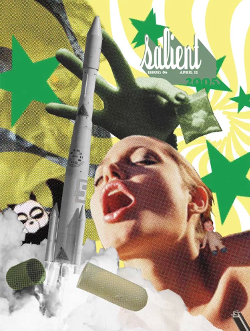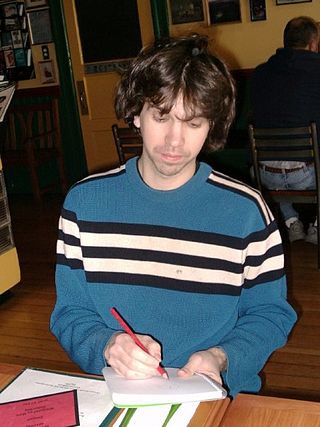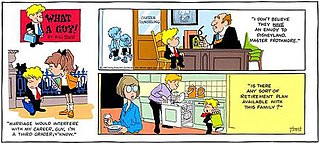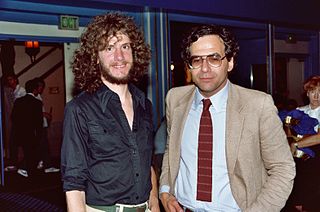Related Research Articles
A graphic novel is a long-form work of sequential art. The term graphic novel is often applied broadly, including fiction, non-fiction, and anthologized work, though this practice is highly contested by comics scholars and industry professionals. It is, at least in the United States, typically distinct from the term comic book, which is generally used for comics periodicals and trade paperbacks.

The Phantom is an American adventure comic strip, first published by Lee Falk in February 1936. The main character, the Phantom, is a fictional costumed crime-fighter who operates from the fictional African country of Bangalla. The character has been adapted for television, film and video games.

Kim Deitch is an American cartoonist who was an important figure in the underground comix movement of the 1960s, remaining active in the decades that followed with a variety of books and comics, sometimes using the pseudonym Fowlton Means.

Franklin Christenson "Chris" Ware is an American cartoonist known for his Acme Novelty Library series and the graphic novels Jimmy Corrigan, the Smartest Kid on Earth (2000), Building Stories (2012) and Rusty Brown (2019). His works explore themes of social isolation, emotional torment and depression. He tends to use a vivid color palette and realistic, meticulous detail. His lettering and images are often elaborate and sometimes evoke the ragtime era or another early 20th-century American design style.

Salient is the weekly students' magazine of the Victoria University of Wellington Students' Association (VUWSA) at Victoria University of Wellington, New Zealand. Salient was established in 1938 and originally published in newspaper format, but is now published as a magazine. Salient's style and editorial position can change from year to year due to changes in editors. However, the magazine has generally taken a left-wing stance.

Elzie Crisler Segar, known by the pen name E. C. Segar, was an American cartoonist best known as the creator of Popeye, a pop culture character who first appeared in 1929 in Segar's comic strip Thimble Theatre.

William Henry Jackson Griffith is an American cartoonist who signs his work Bill Griffith and Griffy. He is best known for his surreal daily comic strip Zippy. The catchphrase "Are we having fun yet?" is credited to Griffith.

Dylan Horrocks is a New Zealand cartoonist best known for his graphic novel Hicksville and his scripts for the Batgirl comic book series.
Tim Fish is a comic book author and artist and playwright, known for the comics Cavalcade of Boys and its spin-off graphic novels, short stories for various anthologies and the original graphic novel Liebestrasse, which was nominated for both a Tripwire Award for Best Graphic Novel and a GLAAD Media Award for Outstanding Comic Book.

Tom Hart is an American comics creator and educator best known for his graphic novel Rosalie Lightning and his Hutch Owen series of comics. He is the co-founder of SAW, the Sequential Artists Workshop.

Ellen Forney is an American cartoonist, educator, and wellness coach. She is known for her autobiographic comics which include I was Seven in '75; I Love Led Zepellin; and Marbles: Mania, Depression, Michelangelo and Me. She teaches at the Cornish College of the Arts. Her work covers mental illness, political activism, drugs, and the riot grrrl movement. Currently, she is based in Seattle, Washington.
The Capital Times was a free alternative weekly newspaper published in Wellington, New Zealand, from 1974 to 2013. It focused primarily on local events, the arts scene, and broader issues concerning the Wellington City region. It included long-running cartoon Jitterati by Grant Buist.
Robyn E. Kenealy is a comic book artist and organiser in the New Zealand art communities. She is based in Wellington and had a role in establishing the 91 Aro St Gallery, organising the New Zealand Comics Weekend and the Eric Awards. Kenealy's early works, Influenza in Wellington and Love Ain't Easy, were predominantly autobiographical comics. Her later work, Roddy's Film Companion, marks a distinct shift from this style. Although Roddy's Film Companion is biographical, it is also fictional and frequently acknowledges the limitations of 'truth' and 'fact' in historical research. These themes are continued in Steve Rogers' American Captain, an autobiographical comic told from the perspective of Captain America's alter-ego.

What a Guy! is an American comic strip created by Bill Hoest and Bunny Hoest, the team responsible for The Lockhorns and Agatha Crumm. It began in March 1987, just over a year before Hoest's death in 1988.

Dean Mullaney is an American editor, publisher, and designer whose Eclipse Enterprises, founded in 1977, was one of the earliest independent comic-book companies. Eclipse published some of the first graphic novels and was one of the first comics publishers to champion creators' rights. In the 2000s, he established the imprint The Library of American Comics of IDW Publishing to publish hardcover collections of comic strips. Mullaney and his work have received seven Eisner Awards.
Canadian comics refers to comics and cartooning by citizens of Canada or permanent residents of Canada regardless of residence. Canada has two official languages, and distinct comics cultures have developed in English and French Canada. The English tends to follow American trends, and the French, Franco-Belgian ones, with little crossover between the two cultures. Canadian comics run the gamut of comics forms, including editorial cartooning, comic strips, comic books, graphic novels, and webcomics, and are published in newspapers, magazines, books, and online. They have received attention in international comics communities and have received support from the federal and provincial governments, including grants from the Canada Council for the Arts. There are comics publishers throughout the country, as well as large small press, self-publishing, and minicomics communities.

Toby Morris is a New Zealand cartoonist, comics artist, illustrator and writer, best known for non-fiction online comics that often highlight social issues.
Tarzan: The Complete Russ Manning Newspaper Strips is a series of books collecting the complete Edgar Rice Burroughs' Tarzan comic strip written and drawn by Russ Manning, an American daily and Sunday strip title originally published in newspapers between 1967 and 1979, via United Feature Syndicate. The first volume of the series was awarded the Eisner Award in the category Best Archival Collection/Project—Strips in 2014. The series was published by The Library of American Comics from 2013 to 2015.
The Beatgirls, a New Zealand girl group formed in 1996, performs covers of musical hits from different eras, with appropriate dance moves, glamorous costumes, and slyly racy banter between songs, in full cabaret shows or as hired entertainment for festivals and parties. While not a franchise, over the years, different trios of women have brought The Beatgirls' trademark humor, glamor, and musical talent to life around the world as well as across New Zealand, developing a degree of acceptance and cultural status across New Zealand's various social groups akin to that of the Topp Twins, even though their music is "pretty largely based on American or British music," according to co-founder Andrea Sanders.
References
- 1 2 "The Jitterati gist". Capital Times. Retrieved 2013-11-02.
- ↑ "Brunswick Documentary". Brunswick: The Documentary (Pt.1). 17 August 2008. Archived from the original on 2021-12-21. Retrieved 2013-11-02.
- ↑ "EXPLOSION OF YOUTHFUL ENERGY BOUND TO ENTERTAIN". Fitz Bunny: Lust for Glory. Retrieved 2013-11-02.
- ↑ "Capital Times newspaper to close". Dominion Post. Retrieved 2013-11-02.
- ↑ Dylan Horrocks, pages 18-19 "New Zealand Comics and Graphic Novels", ISBN 978-0-473-21791-4
- ↑ "Wellington glossy magazine FishHead closes". Stuff. 26 January 2016. Retrieved 2019-01-26.
- ↑ Dominion Post, 18 June 2007
- ↑ The Lumiere Reader, 16 June 2007
- ↑ "Top five plays of the year". The New Zealand Herald. 2010-12-31. Retrieved 2013-11-02.
- ↑ "Theatre Review: Young & Hungry Festival of New Theatre at the Basement". The New Zealand Herald. 2010-07-12. Retrieved 2013-11-02.
- ↑ "Baby Don't Go Home". YouTube. 18 September 2008. Archived from the original on 2021-12-21. Retrieved 2013-11-02.